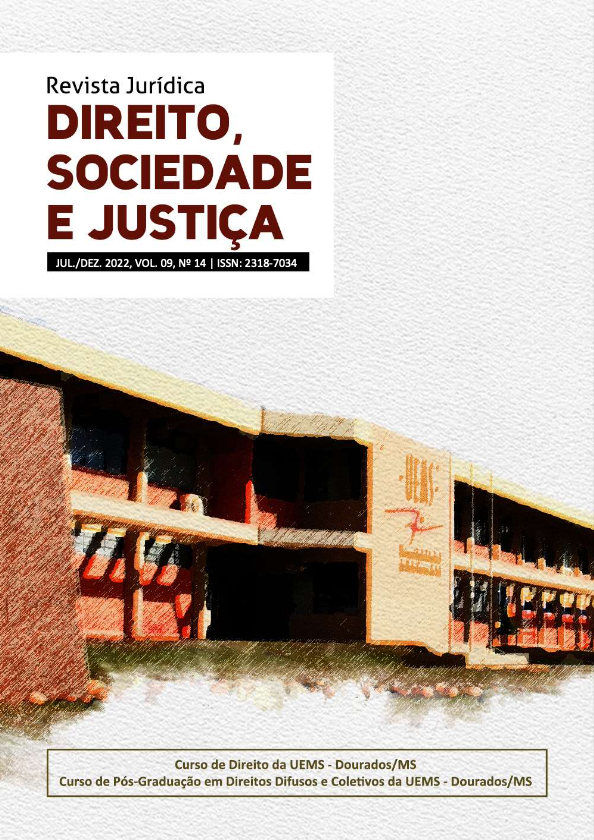O USO DOS INSTRUMENTOS CONSTITUCIONAIS DA DEMOCRACIA DIRETA
REFLEXÕES PARA O APERFEIÇOAMENTO DA DEMOCRACIA BRASILEIRA
DOI:
https://doi.org/10.61389/rjdsj.v9i14.7026Keywords:
Democracy; Brazil; Plebiscite; ReferendumAbstract
This article analyzes the current situation of representative democracy in Brazil, specifically the Brazilian democratic constitutional regime, the way in which political power is exercised and its basic premises, as well as investigates the use/effectiveness/implementation of the instruments made available to citizen for direct participation in the political debate, especially the plebiscite and referendum, and whether there is feasibility in improving these mechanisms, or in the implementation of proposals aimed at improving the democratic apparatus. It uses the deductive method, and exploratory research, which involves bibliographic studies, and, for that, we dialogue with Bobbio (2006b), Arendt (2007), Canotilho (2002), Santos (2000/2002), Barroso (2006), Dallari (2010), among others. The general objective of the article is, therefore, to critically analyze and understand the respective theoretical-normative complex that makes up the current Brazilian democratic political structure, whose paradigm is constitutional. Specifically, the text aims to reflect on the direct popular participation in the realization of the democratic regime, Investigate the instruments made available to the people in achieving democratic ends and whether such mechanisms are effective in terms of use, and finally suggest strategies for the improvement of democracy specifically regarding the use of plebiscite and referendum. We conclusively defend that popular participation needs to advance in Brazil, as one of the ways that we consider urgent and necessary for the improvement of the Democratic State, using the instruments of direct democracy expressed in the Constitution - Plebiscite and Referendum - as necessary and mandatory when the topic debated in the National Congress refers to Fundamental Rights and Guarantees, the recipient of the Rights must, necessarily, manifest itself, under penalty of true fraud to the guarantee system instituted by the Original Constituent.
References
ARAUJO, Luiz Alberto David Araújo. JÚNIOR, Vidal Serrano Nunes. Curso de Direito Constitucional. São Paulo: Saraiva, 2010.
ARENDT, Hanhah. O que é política? Fragmentos das obras póstumas compilados por Ursula Ludz. RJ: Bertrand Brasil, 2007.
BACHELARD, Gaston. A formação do espírito científico. RJ: Contraponto, 1996.
BARROS, Sergio Resende de. Noções sobre o Estado Democrático de Direito. http://www.srbarros.com.br/pt/nocoes-sobre-estado-democratico-de-direito.cont - visita em 05/09/2017 às 15:20
BASTOS, Celso Ribeiro. Curso de Direito Constitucional. SP: Saraiva, 1997.
BENEVIDES, Maria Victória de Mesquita. A cidadania ativa: referendo, plebiscito e iniciativa popular. São Paulo: Ática, 1998.
BOBBIO, Norberto. O futuro da democracia. SP: Paz e Terra, 2006b.
BONAVIDES, Paulo. Ciência Política. São Paulo: Malheiros, 2002.
BULOS, Uadi Lammêgo. Curso de Direito Constitucional. São Paulo: Saraiva, 2009.
BRASIL. Constituição da República Federativa do Brasil. 1988, edição atualizada até março de 2017.
CANOTILHO, José Joaquim Gomes. MOREIRA, Vital. Fundamentos da Constituição. Coimbra, 1991.
CANOTILHO, José Joaquim Gomes. Direito Constitucional e Teoria da Constituição. Coimbra: Almedina, 2002.
CHAUÍ, Marilena. Cultura e Democracia: o discurso competente e outras falas. São Paulo: Cortez, 2007.
DALLARI, Dalmo de Abreu. Elementos de Teoria Geral do Estado. SP: Saraiva, 2010.
FERREIRA FILHO, Manoel Gonçalves. Curso de Direito Constitucional. São Paulo: Saraiva, 1996.
GIL, Antonio Carlos. Como elaborar projetos de pesquisa. SP: Atlas, 2002.
HÄBERLE, Peter. Hermenêutica Constitucional – A Sociedade Aberta dos Intérpretes da Constituição: Contribuição para a Interpretação Pluralista e “Procedimental da Constituição”. Trad.: Filmar Ferreira Mendes. Fabris, 2002.
PATEMAN, Carole. Participação e teoria democrática. São Paulo: Paz e Terra, 1992.
RAMAYANA, Marcos. Direito Eleitoral. RJ: Impetus, 2008.
REALE, Miguel. Teoria do Direito e do Estado. SP: Saraiva, 2000.
SANTOS, Boaventura de Sousa. Reinventar a Democracia. Cadernos Democráticos, Fundação Mario Soares, Gradiva Publicações. 2002.
SANTOS, Boaventura de Sousa e AVRITZER, Leonardo. Introdução: para ampliar o cânone democrático. In: Democratizar a democracia: os caminhos da democracia participativa. RJ: Civilização Brasileira, 2002.
SANTOS, Boaventura de Souza. A difícil democracia: reinventar as esquerdas. São Paulo: Boitempo, 2016, p. 74
SILVA, José Afonso da. Curso de Direito Constitucional Positivo. São Paulo: Malheiros, 2003.
TAVARES, André Ramos. Curso de Direito Constitucional. São Paulo: Saraiva, 2006.
Downloads
Published
How to Cite
Issue
Section
License
O envio de trabalho implica que seu(s) autor(es) concede(m), formal e gratuitamente, à Revista Direito Sociedade e Justiça, os direitos autorais, caso o mesmo seja aceito para publicação, de o incluir, publicar e divulgar em qualquer meio, inclusive em arquivos virtuais, Cd-Rom (ou equivalente), revistas impressas, na página virtual do curso, etc..
Caso referida revista, em qualquer dos seus meios de publicação, sejam comercializadas ou de alguma forma patrocinadas, não retirará a natureza de gratuidade anteriormente prevista.
Os trabalhos publicados terão caráter subsidiário para os usuários na elaboração dos seus estudos, pesquisas, trabalhos científicos e acadêmicos, bem como demais atividades pedagógicas, podendo ser impressos para essa finalidade, sendo que a utilização para fim diverso do aqui estabelecido dependerá de autorização do autor e do conselho editorial da revista.

